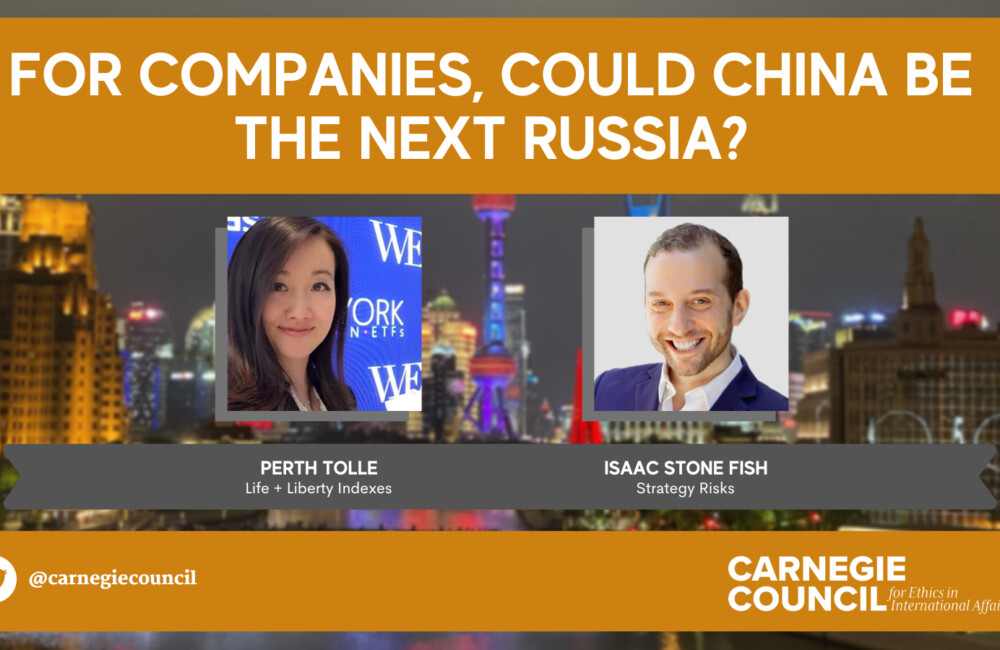Framing ethical perspectives
Business and commerce are at the heart of capitalist societies, and are becoming increasingly powerful as technologies proliferate and leaders acquire vast amounts of wealth and influence. Carnegie Council’s programs, events, and experts analyze these developments through an ethical lens.
Featured Business Resources
Global commerce, ethical investing, and more
NOV 15, 2023 • Podcast
Beijing Rules: How China Weaponized Its Economy to Confront the World, with Bethany Allen
MAR 24, 2022 • Podcast
The Doorstep: How Cryptocurrencies & NFTs May Change the Global World Order, with David Yermack
NYU Stern's Professor David Yermack discusses NFTs, Ukraine, and the future of crypto with Carnegie Council Senior Fellows Nick Gvosdev and Tatiana Serafin.
MAY 6, 2022 • Podcast
For Companies, Could China Be the Next Russia? with Perth Tolle
Isaac Stone Fish and finance expert Perth Tolle discuss the global economic backlash to Russia after the Ukraine invasion, China, and much more.
Related Initiatives
Carnegie Ethics Fellows
The Carnegie Ethics Fellows program (CEF) seeks to cultivate the next generation of ethical global leaders across business, policy, technology, NGOs, and academia.
Carnegie Ethics Accelerator
The Carnegie Ethics Accelerator is a new kind of incubator designed to empower ethics in the face of swiftly evolving challenges in technology and public policies.
Explore Our Business Resources

DEC 15, 2008 • Article
Raising the Bar for Hedge Funds: Self-Policing Preferable to Over-Regulation
Calls for strict oversight of hedge funds have grown recently, particularly since the arrest of trader Bernard Madoff and other high-profile fraud cases. While new ...

DEC 15, 2008 • Article
Policy Innovations Digital Magazine (2006-2016): Commentary: Raising the Bar for Hedge Funds
Calls for strict oversight of hedge funds have grown recently, particularly since the arrest of trader Bernard Madoff and other high-profile fraud cases. While new ...
DEC 12, 2008 • Podcast
Devin Stewart Interviews Chong-Pin Lin
Dr. Lin discusses Taiwan's current political crisis; relations with China; climate change; the future of democracy in East Asia; what Obama's presidency may mean for ...
DEC 11, 2008 • Podcast
Creative Capitalism: A Conversation with Bill Gates, Warren Buffett, and other Economic Leaders
Michael Kinsley and William Easterly discuss Bill Gates's controversial proposal for "creative capitalism," in which big corporations integrate doing good into their way of doing ...

DEC 10, 2008 • Article
Policy Innovations Digital Magazine (2006-2016): Briefings: Germany Moves from Atoms to Photons
Predictions that Germany will be left dangling in the wind once its nuclear power plants are shut down may be premature. Pro-renewables policies have thus ...

DEC 9, 2008 • Podcast
Remix: Making Art and Commerce Thrive in the Hybrid Economy
We are harming our children--and almost anyone who creates, enjoys, or sells any art form--with a restrictive copyright system driven by corporate interests. Lessig reveals ...

DEC 8, 2008 • Podcast
The Ascent of Money: A Financial History of the World
Does the symbiotic relationship between China and America--"Chimerica" as Niall Ferguson calls it--give reason to hope that America's present economic situation will turn out ...

NOV 21, 2008 • Article
Policy Innovations Digital Magazine (2006-2016): Commentary: Corporate Social License and Community Consent
Moving beyond "social license" to respecting the principle of consent can be an effective way for companies and communities to control risks and create mutual ...

NOV 18, 2008 • Article
Policy Innovations Digital Magazine (2006-2016): Briefings: Electric Jeepneys Challenge a Philippine Icon
The Philippine passenger jeepney has started to shed its image as a smoke-belching, eardrum-busting public utility vehicle. Originally fashioned out of WWII American military jeeps, ...
NOV 18, 2008 • Podcast
The Squandering of America: How the Failure of Our Politics Undermines Our Prosperity
For 30 years, the economic condition of most Americans has become ever more precarious. To change this requires a cogent ideology and politics of a managed, ...



